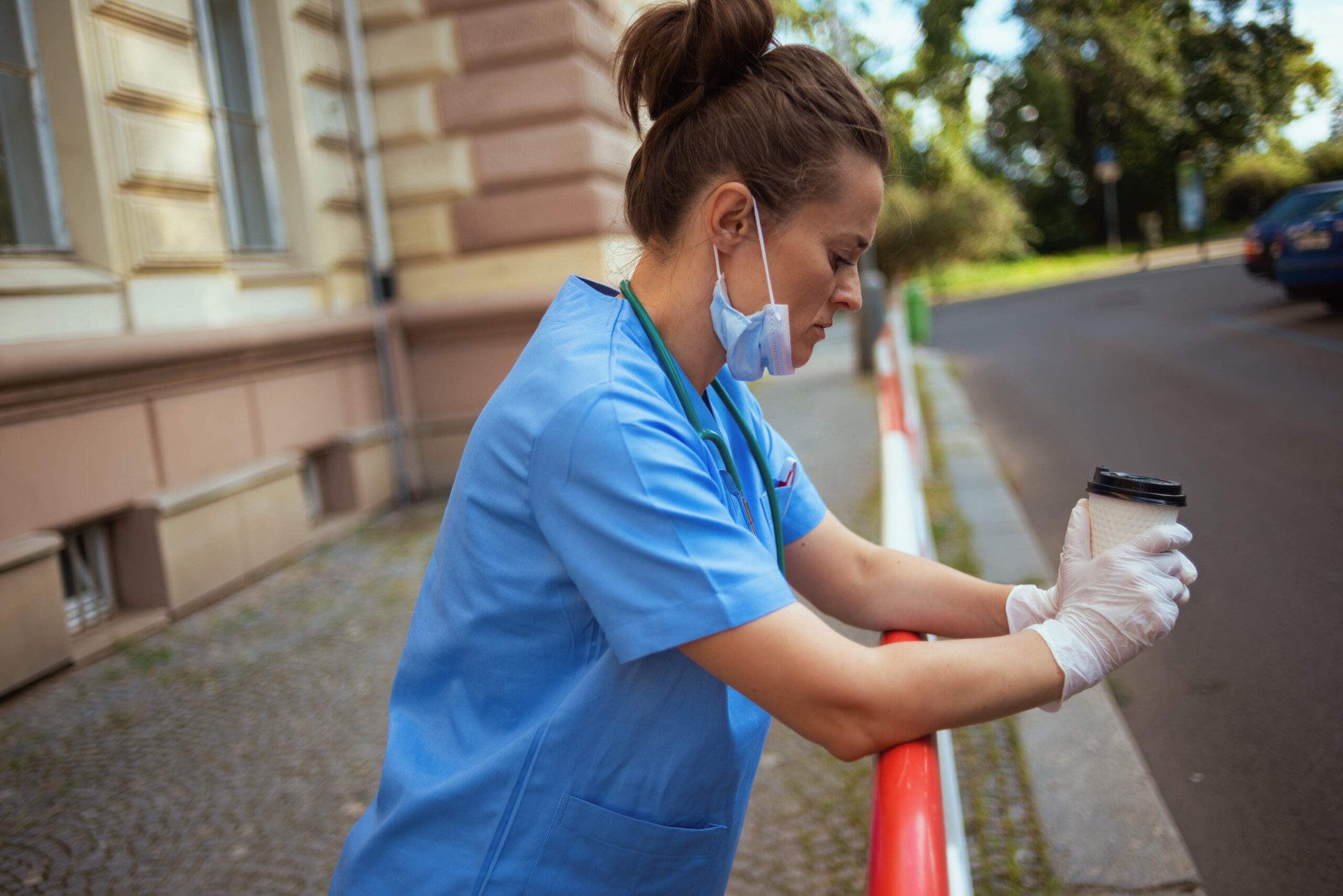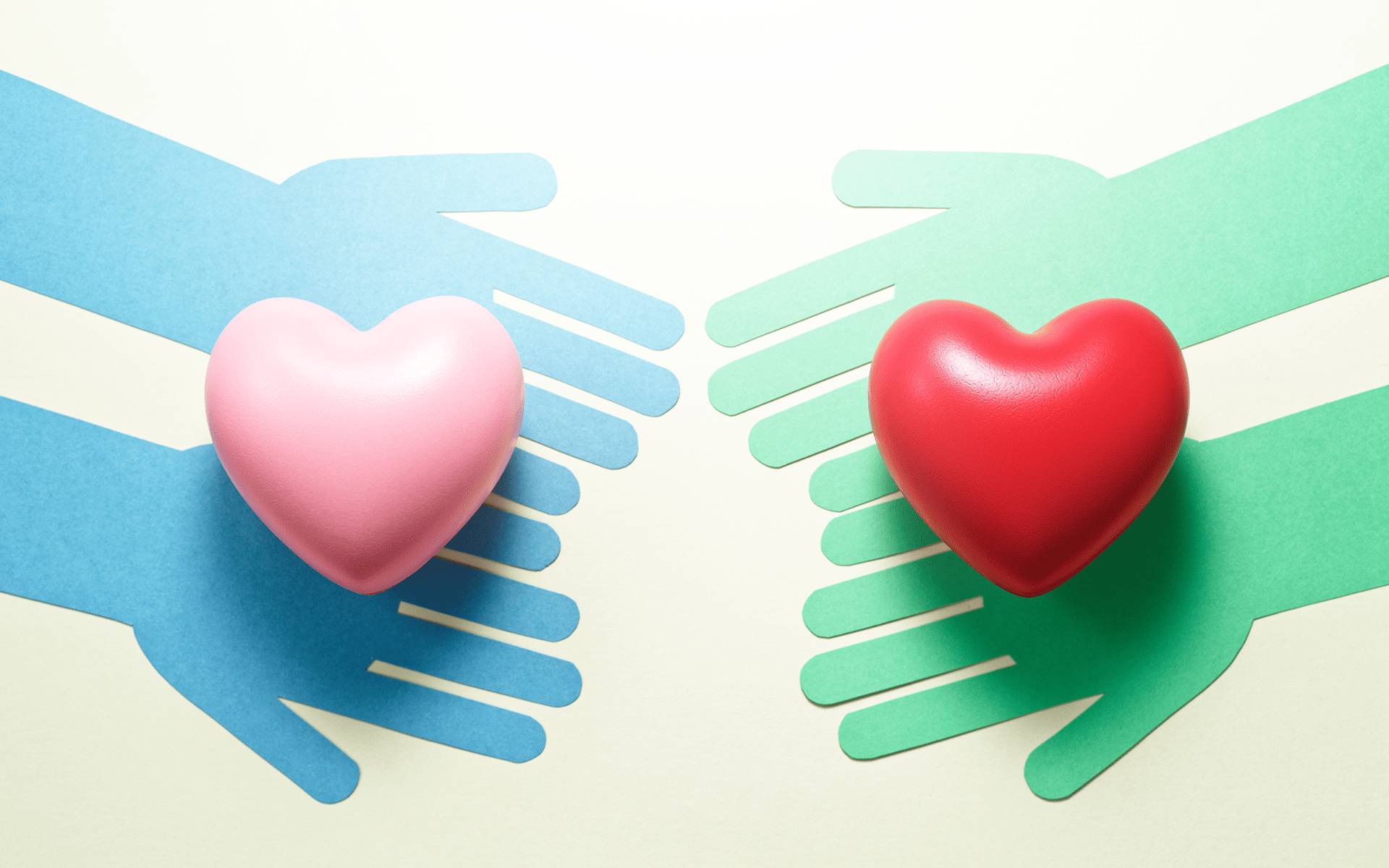In April 2020, Caitlin McGeehan, a critical care and palliative medicine nurse at Johns Hopkins Hospital in Baltimore, Maryland, found herself facing an unimaginable situation. Cloaked from head to toe in a biocontainment suit, McGeehan entered the room of a COVID-19 patient experiencing respiratory failure. As the doors slid shut behind her, McGeehan felt as if she’d walked into an isolated moonscape—whooshing sounds circulated through her air-purifying hood, with the hiss of the lifesupport machines keeping her patient alive. Between the stressors of COVID, wearing the containment suit in this eerie environment, and feeling emotionally and physically isolated by the pandemic, McGeehan momentarily lost confidence. “I was acutely aware that I didn’t necessarily have the resources and support to do my job well and safely,” she recalls. “The patient was breathing fast and unable to articulate his needs, and I just tried to steady my breath and calm my body, so I could act more quickly in response to what he needed.”
Feeling enormous responsibility to treat her patient with care and empathy, McGeehan called upon tools she learned in 2016 during a mindfulness and resilience program for nurses. Bringing awareness to her physical experience—with the help of mindful breathing and a body scan—allowed her to self-soothe and regulate the emotional whirlwind she felt. Asking herself questions such as, “How can I serve?” and “What is the need here?” gave her the focus she needed to effectively care for her patient, as well as be the touchpoint for the patient’s family.
What McGeehan experienced when she first entered the patient’s room was a moment of moral suffering, a concept that has emerged through research on healthcare communities. When a nurse finds themselves in a situation where what they believe they ought to be doing differs from what they are doing in the context of patient care, there is a dissonance that occurs—and the result is moral suffering, explains Dr. Cynda Hylton Rushton, a professor of nursing and pediatrics at Johns Hopkins University, and coauthor and editor of Moral Resilience: Transforming Moral Suffering in Healthcare. “Moral suffering leads nurses to feel compromised at a deep level,” Rushton says. “How do I make sense of the conflict I feel when asked to do things that I thought caused more harm than good and I was the implementer of those decisions, and saw the consequences firsthand?”
The challenges most of us navigate daily may not be of this life-and-death magnitude. Struggling to make an organizational decision that could adversely impact employees, or feeling unable to provide your children with care and attention while balancing the demands of work and your own need for rest, represent situations where moral suffering could arise. Whatever the exact nature of the decisions and dilemmas we face, the feeling of being too pressured or undersupported to act in alignment with our values has real effects on our mental health, and on whether we reach a point of burnout.
A Prescription for Resilience
It’s a problem for which Dr. Rushton has helped us, literally, to find new words. Rushton coined the term moral resilience: the capacity to sustain integrity in response to morally difficult circumstances. (Integrity is defined by Rushton as a sense of wholeness and being in alignment with your values, personally as well as in relationships). In response to the crisis of burnout in healthcare—a 2021 study in JAMA: The Journal of the American Medical Association showed that among nurses who reported leaving their current job, 31.5% reported leaving because of burnout in 2018—Rushton developed an educational program for nurses called Mindful Ethical Practice and Resilience Academy, or MEPRA, launched in 2016. Research on the program’s efficacy showed significantly increased levels of mindfulness, ethical competence, confidence, work engagement, and resilience for the nurses who participated, as well as lower levels of depression, anger, and intent to leave their jobs.
By teaching skills including mindfulness, self-regulation, and somatic awareness—tuning in to body sensations—Rushton aims to educate and empower nurses. “Our work is really hard and there will always be ethical challenges and tradeoffs,” says Rushton. But when observing the nurses move through the MEPRA program, she notices a transformation. “They are so depleted and discouraged when they begin, and like a lotus flower slowly unfolding, they become themselves—confident, resourced and replenished, with tools and skills to meet the moment, and feel capable of facing issues, knowing there’s something they can do now.”
A March 2021 survey of US employees found that 52% of respondents feel burned out, and more than two-thirds (67%) report the feeling has worsened over the course of the pandemic. If moral resilience training can reduce burnout among frontline nurses, can it help the general, non-healthcare population?
How to Tune In to Your Integrity
This research indicates that mindfulness practices offer a path to cultivating personal and relational integrity when faced with a morally challenging situation—and, Rushton says, this also applies to non-healthcare workers. “Everyone these days is confronting dissonant and conflicting views, commitments and perspectives, and we are all searching for a path to greater clarity, confidence, and contentment,” explains Rushton. “Integrity, being whole
and undiminished, is one pathway for finding our way back ‘home’ to who we really are, what we stand for, and what matters most in life and work. Integrity is not perfection but rather honoring our strengths and limitations with honesty and compassion.” For Caitlin McGeehan, maintaining her integrity while serving others at work looks like practicing listening to the signals of her body to identify how she feels before responding, and recognizing the value of perspective-taking—the ability to negotiate based on the understanding of different vantage points. “If I’m going to provide whole patient care and have a good sense of where everyone—the various teams, surgeons, family, and, of course, the patient—is coming from and each facet of their experience in the process, then I need to be whole myself,” she says. “A lot of what I do is give courage to people who are anticipating really difficult times, and that takes a lot of energy and effort.”
Leaning in to that energy and effort is key to building resilience. “Integrity requires us to ask hard questions, to not turn away from hard things, to be courageous and make clear to ourselves and others who we really are,” says Rushton. “It’s about restoring our ability to choose as fully aware moral agents.”
Change From the Inside
We know that having healthy boundaries between work and family or leisure improves well-being. Mindfulness, among many of the principles of moral resilience, is a research-backed way of practicing the skills of presence and self-kindness that let us maintain those boundaries. “When I wake up in the morning, the ticker tape in my mind starts about all I have to do and worries and patients,” said McGeehan. “So I take a moment and just enjoy waking up and being in bed, and acknowledge being present in that moment.”
Our moral resilience also grows by nurturing workplace relationships of vulnerability and honesty. Caitlin Florin, a registered nurse in the cardiovascular surgical ICU at Johns Hopkins, brings her resilience training to her unit’s culture, gathering with other nurses to pause and breathe together, and encouraging conversations about difficult emotions. “To be resilient is to stay strong and true to your values in the face of challenge, keeping that harmony in yourself while there’s a hurricane going on around you,” she says.
Through moral resilience, and its emphasis on mindfulness, Dr. Rushton invites frontline nurses—and anyone who will listen—to learn tools to ultimately answer the questions: Who are you, really? Why does your work matter? What do you stand for? And how do you find your voice, to speak about what is right for you? Looking to this research from healthcare communities can help us cultivate moral resilience in everyday life. “Using mindful awareness to notice when you are acting in alignment with your values, what you are feeling in your body, the emotions, the quality of mind, that there’s not too much stress in that moment, that’s home base,” said Rushton. “Then to notice when you’re out of alignment, when the nervous system is wonky, you can apply attention and then the skills to bring you back into alignment.”
read more
How Naming Can Empower Patients, and Other Mindful News
From cultivating peaceful neighborhoods in Minneapolis to shifting the bias in medical names, here’s what’s new in the world of mindfulness.
Read More
Three Signs of Burnout in Healthcare—and the Role of Mindfulness in Healing the System
Cardiologist Jonathan Fisher unpacks the need to be aware of what the epidemic of burnout looks like, and how mindfulness can serve healthcare providers.
Read More
How Mindfulness Can Bring Healing to Health Care
The crisis of stress and burnout among healthcare workers asks for more than just individual training. Dr. Jonathan Fisher unpacks why we need mindfulness at all levels of the system to create real change.
Read More









